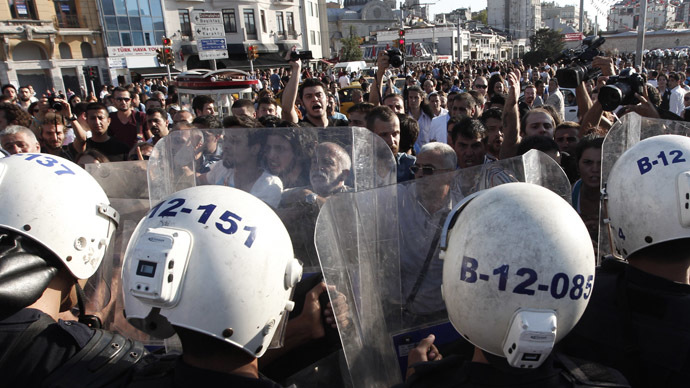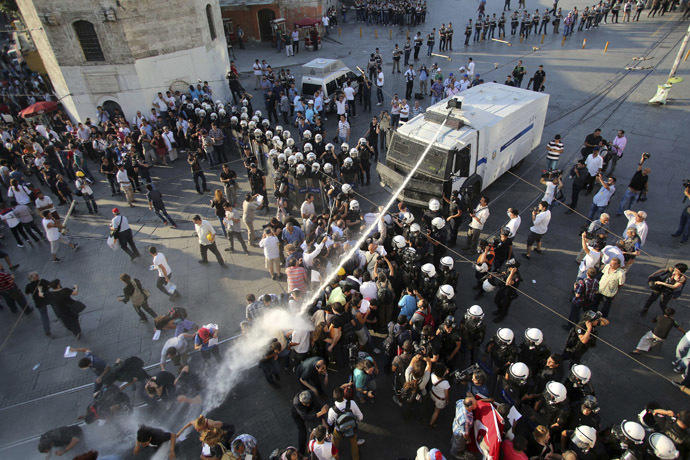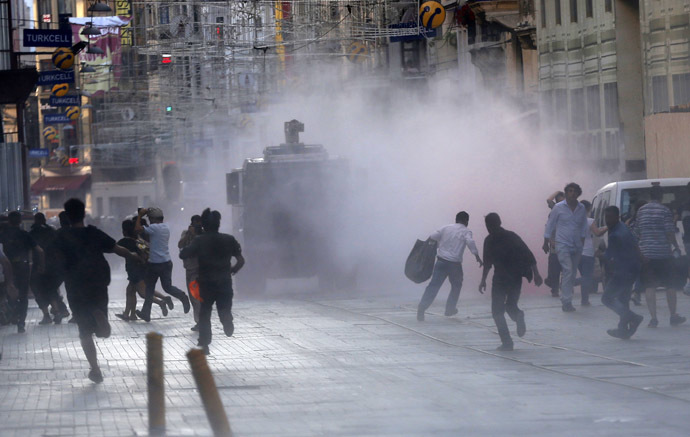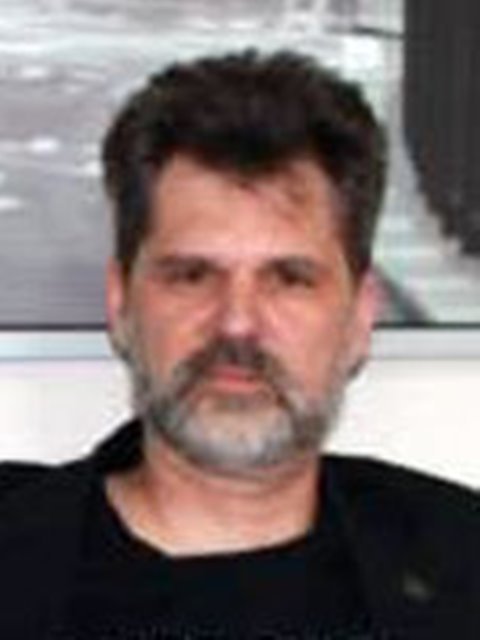The Gezi anniversary and Turkey's future under 'President' Erdogan

Turkey's government, led by the AKP (or Justice and Development Party), has been under attack since last year when Gezi Park first saw protests which subsequently spread throughout the country and managed to galvanize the world.
Initially, the protests which started on May 31 2013 focused on the government's extreme policy of urbanization and the subsequent boom in construction. The mega-projects are part of a veritable building frenzy that knows no bounds and often manages to devastate the natural beauty and even parts of the country's historical heritage standing in the way of progress and modernity.
The construction of a third Istanbul airport and a third bridge across the Bosphorus, for instance, will destroy a forested area of about 8,715 hectares equivalent to 8,000 soccer stadia. As a result, a community effort opposing these developments was formed, the so-called 'Northern Forests Defense'. And even though someone like Yasar Adnan Adanali, an urban planner and university lecturer, can now say that "although [the defense of the northern forests] hasn't become a mass movement to a fuller extent, it can be said [that] there is a higher level of awareness in comparison with the past about other living spaces under threat and there is more of a struggle [to protect these sites]."
But these forests and accompanying water basins, dams, natural parks, and numerous species of unique plants and animals not found anywhere else are located in the space between the outskirts of the inhabited zones of the metropolitan area of Istanbul and the shores of the Black Sea, and hence do not possess the ready access and urban flair that turned Gezi Park into a national (and international) icon. In that case, the removal of "twelve trees" (as Prime Minister Erdogan keeps repeating in his speeches) led to popular demonstrations against the AKP-led government's ruthless form of urban renovation aimed at turning the wider Taksim area into a concrete garden, devoid of any green and other forms of living color.
These environmentalist protests soon morphed into a popular movement defying the government led by Recep Tayyip Erdogan and voicing the unease of an apparently large part of Turkey's electorate (judging by the recently held municipal elections, about 55% of the people who voted do not approve of Erdogan's party that nevertheless gained the majority of the votes, i.e. 45%).
This first appearance of vocal dissent with the ruling party last summer was followed by revelations of corruption and sleaze at the highest level towards the close of the year. In his denunciations of the protests and last December’s corruption allegations Erdogan easily lumped both events together, calling them the work of reprehensible forces intent on destroying Turkey's economic miracle and political stability. In the course of the violent crackdown focused on Gezi Park, a total of 11 deaths and approximately 8,163 injuries occurred (arguably, victims of state terror).

Political choices
The AKP-led government was totally unnerved by these signs of popular dissatisfaction as could be seen on the recent anniversary of the Gezi Protests, when the authorities employed huge numbers of police to prevent any kind of commemoration or outbreak of renewed protest.
In the end, the government remains in power and Erdogan seems set to become Turkey's first popularly elected president this coming August. And even though he remains a highly polarizing figure, his command over wide swathes of Turkey's population is beyond doubt. These displays of popular discontent only seem to strengthen his resolve to stay in power. In view of the absence of any halfway convincing figure on the opposition, Tayyip Erdogan will continue to cultivate his image as Turkey's strongman who is leading his people back into the fold of Islam.
At the moment, he seems to be quite at ease in the region where another strongman has recently shed his military uniform to climb the political stage – Egypt's former army chief Abdel Fattah al-Sisi emerged victorious from the three-day elections held in Egypt recently. The Director of the Middle East Programme at the Toledo International Centre for Peace in Madrid John Bell posits that "Sisi and Nasser are often compared because they are both military men who arrived in politics at a critical time in Egyptian history and who garnered populism through charisma". Bell thus suggests that the image of Egypt's current leader somehow resembles that of Gamal Abdel Nasser, the great Egyptian nationalist and pan-Arab leader of the 1950s and 1960s. After all, Sisi himself has not shied away from describing himself as a Nasserist, appealing to recent history and the Egyptian population's collective memory to gain widespread popularity to win a landslide electoral victory.
And now, Sisi is Egypt's current strongman undoubtedly on his way to forge his own personality cult, as evidenced by the plethora of Sisi-themed merchandise, such as t-shirts, jewelry, perfume, chocolates, and even sandwiches proudly sporting the image or name of the former military leader, for sale in Cairo's streets. The Middle East is no stranger to such irrational adulation of leader figures, nor is Turkey, where until very recently the iconographic presence of Mustafa Kemal Atatürk was ubiquitous and possibly stifling. Turkey's present leader Erdogan has a strange relationship with Egypt's new president. In a coup-that-wasn't-a-coup, Sisi ousted Islamist President Mohammad Morsi, and Turkey's Prime Minister did not hide his revulsion as his sympathies for the Muslim Brotherhood are well-known and documented. As a result ideologically, Erdogan is arguably staunchly opposed to the line taken by Egypt's new president.
Reintroduction of Islam
The former Israeli Ambassador to Egypt Zvi Mazel said recently that "Abdel Fattah al-Sisi is Egypt’s strong man right now and has been fighting against radical Islam and against the Muslim Brothers," following in the footsteps of Nasser and particularly Mubarak, who were both well-known for their enmity to the Brotherhood. But in reality, Islam in Mubarak's Egypt was not rejected nor was religion confined to the personal sphere, as common in a secular system. Hosni Mubarak, who came to power after Anwar Sadat's assassination by a member of Islamic Jihad, an offshoot of the Muslim Brotherhood, upheld Article 2 of Egypt's 1971 Constitution, which proclaims that "Islam is the religion of the State and Arabic its official language" and that "Islamic law (Sharia) is the principal source of legislation." In addition, Mubarak relied heavily on Al-Azhar, Cairo's university that was founded in the late 10th century, and the Fatimids as a center of Islamic learning, to give legitimacy to his policies. Mubarak employed fatwas (or religious edicts) issued by Al-Azhar to justify participation in the second Gulf War and to denounce Islamic extremism and terrorism. While on a street-level, he nationalized the country's mosques, thereby controlling their output and hold over wide swathes of the population. But, Mubarek was opposed to the Muslim Brotherhood, as a rival force using Islam to control the population and their activities. His current successor Sisi will continue this anti-Brotherhood policy, which places him in direct conflict with Turkey's Prime Minister Erdogan.
In Turkey, Tayyip Erdogan is apparently determined to re-introduce an overt Islamic discourse into the country's public and political life, a situation which is all but normal in a country like Egypt, even if ruled by somebody like Sisi. Turkey's original 1924 Constitution also contained the phrase that that "Islam" constitutes the "religion of the state" (Article 2), which was subsequently removed four years later and might very well be set to return now that the AKP is ruling the land. Opposed to Sisi on ideological grounds, Erdogan also appears determined to fashion his own personality cult, arguably similar to the newly elected Egyptian president's efforts. In August, Erdogan even hopes to emulate Abdel Fattah al-Sisi as the glorious victor of an electoral contest, an electoral contest that would see him move to the Cankaya Palace as Turkey's new President.

The Gezi protests have laid bare the cultural rift existing in Turkey, with self-proclaimed secularists, who see themselves as the protectors of Turkish modernity, opposing conservative Muslims, who aim to unite the tenets of Islam with the requirements of modern life in Mawdudi-like fashion (an argument I explained elsewhere at length). Seen against this backdrop, it would appear that Tayyip Erdogan's ambitions as Turkey's president are far-reaching indeed. Turkey's self-image as a modern nation has for decades relied on the iconography of Atatürk, his countenance traditionally seen looking down on Turkey's citizens in paternalistic fashion through the innumerable paintings and statues of the nation's founder that used to litter the country. Under the AKP this ubiquity has somewhat receded, but his image is still a popular prop. Even Erdogan is not averse of appropriating this Turkish icon for his own ends, known as he is to give speeches in front of huge pictures of himself and Atatürk positioned side by side. This backdrop is arguably used to suggest Turkish unity and commitment to progress and modernity, initiated by the founding father himself in the 1920s and brought to its culmination in the 21st century by none other than the leader of the AKP and current Prime Minister-and-soon-to-be President of Turkey, Recep Tayyip Erdogan.
The above-quoted Bell, in conjunction with John Zada, a freelance photographer and author, writing on their communal blog Al-Bab, say insightfully that the figure of Mustafa Kemal Atatürk "has long been treated with godlike reverence by many of his co-nationals". In a Turkish context, Atatürk represents the ultimate model of the figure of the strongman or leader, as he was the military commander who defeated the nation's enemies and subsequently led his people into the modern world - a modern Turkey where Islam was still an important aspect, albeit supposedly relegated to the private sphere and under strict state control through the good offices of the Diyanet or Directorate of Religious Affairs. In the end, it is my contention that Erdogan wants to become another Atatürk for the Turkish nation. Whereas the first President (1923-38) ushered his fellow-Turks into the modern world, arguably shedding any excessive traits of their Islamic persuasion in the process, Erdogan wants to be the President of the Republic starting 2014 to complete this task by means of reviving the Turks' ties to their Muslim creed and uniting all the ethnic groups and sub-groups living on Anatolian soil under the banner of Islam.
The statements, views and opinions expressed in this column are solely those of the author and do not necessarily represent those of RT.
The statements, views and opinions expressed in this column are solely those of the author and do not necessarily represent those of RT.













